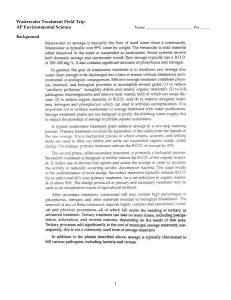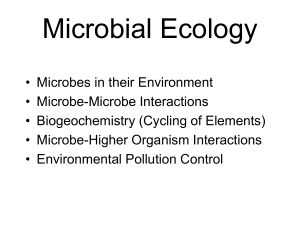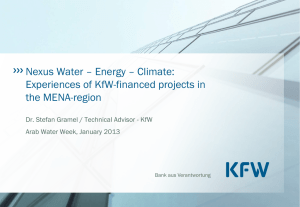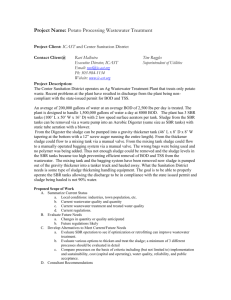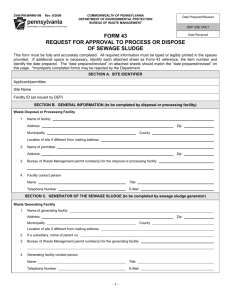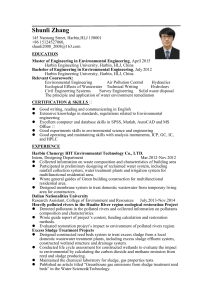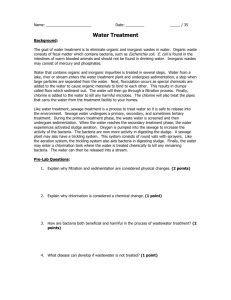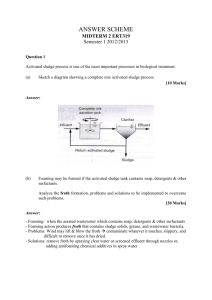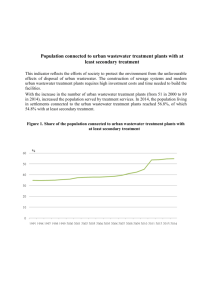6 Organisation of the Study
advertisement
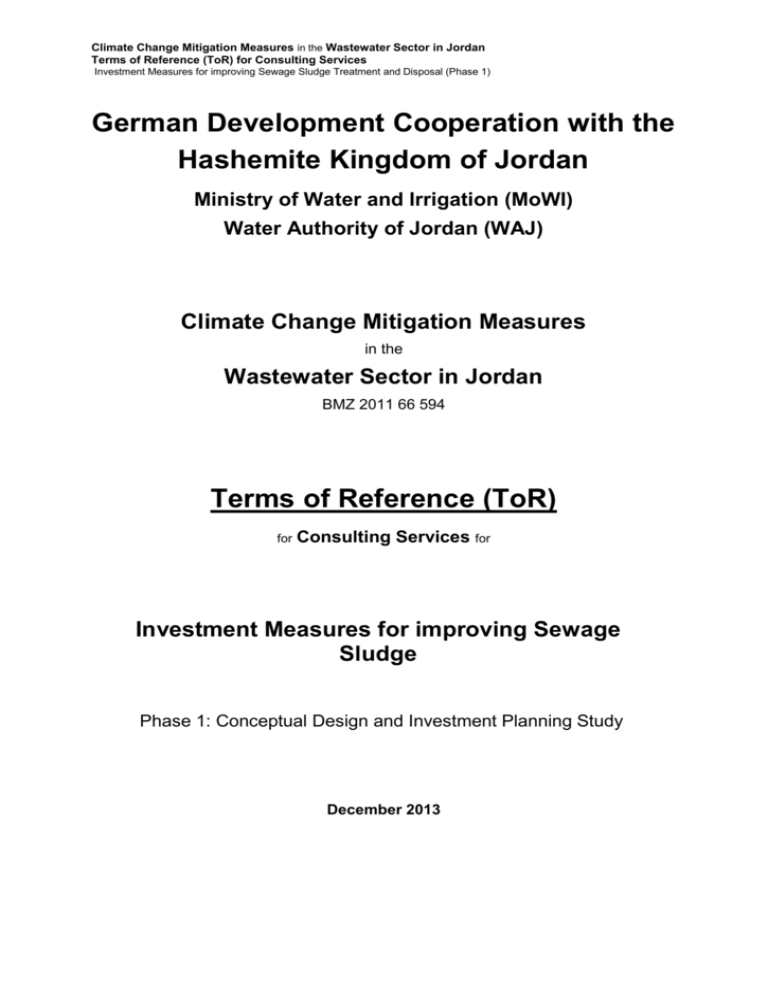
Climate Change Mitigation Measures in the Wastewater Sector in Jordan Terms of Reference (ToR) for Consulting Services Investment Measures for improving Sewage Sludge Treatment and Disposal (Phase 1) German Development Cooperation with the Hashemite Kingdom of Jordan Ministry of Water and Irrigation (MoWI) Water Authority of Jordan (WAJ) Climate Change Mitigation Measures in the Wastewater Sector in Jordan BMZ 2011 66 594 Terms of Reference (ToR) for Consulting Services for Investment Measures for improving Sewage Sludge Phase 1: Conceptual Design and Investment Planning Study December 2013 Climate Change Mitigation Measures in the Wastewater Sector in Jordan Terms of Reference (ToR) for Consulting Services Investment Measures for improving Sewage Sludge Treatment and Disposal (Phase 1) Table of Contents 1 BACKGROUND INFORMATION 1 2 Present Situation 1 2.1 2.2 2.3 2.4 3 Generalities Problem Analysis Project Objectives and Indicators Previous Studies and further relevant Parties Scope of Work 3.1 Generalities 3.2 Planned Results and Deliverables 1 2 2 3 4 4 4 4 SCOPE OF SERVICES 5 5 Staffing 8 5.1 5.2 5.3 5.4 5.6 5.7 6 Key Expert 1: Project Manager/Team Leader Key Expert 2: Expert specialised in Sewage Sludge Treatment Key Expert 3: Financial Expert / Economist Key Expert 4: Environmental Expert Other Experts Support Staff and Backstopping Organisation of the Study 6.1 6.2 6.3 6.4 6.5 Responsible Body Management Structure Facilities to be provided by the Contracting Authority Other Accommodation Facilities to be provided by the Consultant 8 9 9 9 9 10 10 10 10 10 11 11 7 Timeframe and Reporting 11 8 Monitoring and evaluation 12 ANNEXES Annex 1 List of available Documents Annex 2 Tentative Activity Schedule Climate Change Mitigation Measures in the Wastewater Sector in Jordan Terms of Reference (ToR) for Consulting Services Investment Measures for improving Sewage Sludge Treatment and Disposal (Phase 1) ABBREVIATIONS BMZ CDM CERs CIP DEG DPP DUC DS EU EUR FC FS GHG GoJ GIZ GWP IPCC JD, JOD KfW KTR MWI MDG NGO O&M PE PEA PPP PSP SCADA SSTDP WAJ WSP WB WW WWTP German Ministry of Economic Cooperation and Development Clean Development Mechanism Certified Emission Reduction Capital Investment Plan Deutsche Entwicklungs- und Investitionsgesellschaft Development Partnerships with the Private Sector Dynamic Unit Costs Dry Solids European Union Euro (European currency) Financial Co-operation Feasibility Study Greenhouse Gas Government of Jordan German Agency for International Cooperation Global Warming Potential Intergovernmental Panel on Climate Change Jordanian Dinar KfW Development Bank (German Agency for Financial Cooperation) King Talal Reservoir Ministry for Water and Irrigation Millennium Development Goals Non-Governmental Organisation Operation and Maintenance Population Equivalent Project Executing Agency Public Private Partnership Private Sector Participation Supervisory Control and Data Acquisition System Sewage Sludge Treatment and Disposal Programme Water Authority of Jordan Wastewater Stabilisation Pond World Bank Wastewater Wastewater Treatment Plant 1 BACKGROUND INFORMATION The beneficiary country is the “Hashemite Kingdom of Jordan”, represented by the “Water Authority of Jordan (WAJ)”. WAJ is the Project Execution Agency (PEA) and the project beneficiary. WAJ’s nominated Programme Manager (PM) will act as a programme coordinator on behalf of the PEA. The Government of Jordan (GoJ) and the Government of the Federal Republic of Germany intend to finance “Climate Change Mitigation Measures in the Wastewater Sector in Jordan”, which comprises the financing of consulting services for the elaboration of a Conceptual Design and Investment Planning Study (Phase 1 – this tender) for improving the Sewage Sludge Treatment and Disposal (SSTDP) infrastructure in a pre-selected number of cities and towns in Jordan. The German contribution for the investments and the consulting services will be channelled through KfW. 2 PRESENT SITUATION 2.1 Generalities Jordan, which is known to be one of the most water scarce countries in the world, is facing, to an increasing degree the impacts of climate change. Therefore it is intended to take under the framework of German-Jordanian Financial Cooperation the concerning set of problems further into account. The new program “Climate Change Mitigation in the Jordanian Wastewater Sector” aims at addressing problems in the wastewater sector, which are closely linked to poor energy efficiency at wastewater treatment plants, sewage sludge treatment and disposal, as well as the negatively affecting impact on green-house gas emissions. In order to assess the current wastewater situation in Jordan, an expert mission, financed by KfW, elaborated and presented the “Climate Change Mitigation Measures in the Wastewater Sector in Jordan” Report in May 2012. The report provides an overview of the existing wastewater situation in Jordan with regard to: (i) Legal and administrative background; (ii) Situation of wastewater and sludge treatment of 28 major wastewater treatment facilities; (iii) Ways and possible methods of sludge treatment and disposal; (iv) Conceptual proposals and general approach for the identification of potential options of optimised sludge treatment, improved wastewater processing and reuse of treated wastewater; (v) Valuation of the energy efficiency potential; and (vi) Generalized investment and operation cost assessments for improvement measures. However, the main objective of the current programme with an anticipated investment of 25 million EUR is only related to the improvement and optimisation of sewage sludge treatment and disposal measures. Currently, the expansion of the largest Jordanian WWTP in Al Samara (treating the wastewater or the region Greater Amman) is under implementation. A USAID-financed feasibility study regarding treatment, reuse and disposal of the sewage sludge from this WWTP is ongoing. One option for the disposal would be the construction of a landfill for the treated sludge of Al Samra WWTP. Measures for disposal/ recovery of sludge from the WWTP Al Samra can be part of the KfWproject. Nevertheless, the main focus of this project lies in the implementation of measures for the sludge treatment of other WWTP. As the concept for treatment, reuse and disposal of 1 the Al Samra WWTP-sludge is considered in the USAID-financed study and it is not part of the services of this tender. The envisaged overall programme measures are planned to be split-up into the following two consecutive phases: Phase 1: Conceptual Design and Investment Planning Study (this tender); and Phase 2: Consulting Services for the implementation of approved / prioritised investment measures for the improvement of sludge treatment and disposal in Jordan. 2.2 Problem Analysis The dedicated efforts and substantial investments in the wastewater sector within the last 20 years increased the coverage ratio of wastewater services (collection and treatment) in Jordan to about 70% in average. However, with the continuously increasing volumes of treated wastewater the remaining final product of the treatment processes, the sewage sludge, increased as well tremendously. In most parts of the country the sewage sludge treatment and disposal/utilization had not been an integral part of the previous wastewater sector related investments. This led to a situation where the untreated and mainly only temporarily deposited sewage sludge threatens the quality of water resources and impacts quite negatively the hygienic and health conditions of the people living in the surrounding areas of those facilities. This applies as well for the by far largest WWTP in Jordan, Al Samara, where the sewage sludge is only inadequately stored just adjacent to the plant for years with the evident consequence that space for future disposal is declining and the negative environmental impacts are reaching intolerable levels for the WWTP’s staff and all people living the area. This programme focuses on the systematic and appropriate implementation of sewage sludge treatment and disposal/ utilisation measures with the ultimate goal that once completed the full chain of wastewater sector related structural, operational and organisational requirements shall be in line with defined International and Jordanian standards. The project measures are meant to contribute to the energetically optimized treatment and environmental sound disposal / utilisation of sewage sludge. Consequently, it can be concluded that the planned Sewage Sludge Treatment and Disposal Programme (SSTDP) complies with and contributes towards an efficient and sustainable water resource management in Jordan as well as to the GoJ’s climate protection efforts. 2.3 Project Objectives and Indicators The overall goal of the project is to contribute towards and efficient and sustainable water resources management in Jordan as well as to the Jordanian climate protection efforts. The project will contribute to the environmental sound disposal/utilisation of sewage sludge and energetically optimized an environmental sound sludge treatment (project objective). This comprises the systematic and state of the art new implementation and / or upgrading of any existing sludge treatment for a prioritized number of major city and town locations in Jordan. The focus of financing under this initial programme is primarily directed towards improvement measures for environmentally sensitive larger units (e.g. Irbid WWTPs, etc.) but needs to outline as well the required overall long-term strategy for improving sludge related aspects and facilities for all urban areas in the country. Appropriate solutions for any of the proposed individual improvement measures must comply with the climate change mitigation principles (reduction of GHG emission, re-use of biogas, etc.) on one side but need to be as well economically justified and financially affordable for the final beneficiaries. 2 Depending on the measures that will be selected, the objective of the project may be regarded as achieved if the following relevant indicators have been achieved: One year after the finalisation of investment measures, sewage sludge form other WWTPs, which are targeted by sludge treatment (dewatering and drying) investment measures, will be reduced by at least 65%. One year after the finalisation of investment measures, Greenhouse Gas Emissions will be reduced by x t/CO2-eqv. (target and baseline will be determined when the selection of investment measures is completed). One year after the finalisation of investment measures but not earlier than 2018, at least 95% of annual WWTP Al Samra’s sewage sludge is utilized or disposed in an environmentally sound manner (this indicator is linked to potential measures of the sludge from WWTP Al Samra). The project forms part of the overall strategy of the Jordanian-German development cooperation in the water sector which aims at an integrated water resource management and pursuit of the Millennium Development Goals (MDG). 2.4 Previous Studies and further relevant Parties Existing studies and any other programme related documents are listed in Annex 1. The main actors in the in the Jordanian water and wastewater sector are as follows: (i) Water Authority of Jordan (WAJ); (ii) Jordan Water Company (Miyahuna); (iii) Yarmouk Water Company (YWC); (iv) Aqaba Water Company; (v) Zarqa Water Administration; (vi) Water and wastewater utilities of other smaller towns in the country; and (vii) KfW Development Bank (KfW). The consulting services under this assignment shall be elaborated by the consultant in close and mutual communication and cooperation with the above stated parties and any other concerned national and / or local authorities. 3 3 SCOPE OF WORK 3.1 Generalities The PEA is seeking to engage a qualified consultant to perform consultancy services for the elaboration of a comprehensive conceptual and long-term investment planning study for the new construction, upgrading and / or extension of sewage sludge treatment facilities at existing WWTPs in Jordan. The results and recommendations of this study shall be used as guidance for the consecutive planning and implementation of future investments in the sector. WAJ and KfW have mutually agreed that the solution of the apparent sludge disposal problem of the Al-Samra WWTP (Amman) shall have priority over the other foreseen and required measures. Remaining funds shall be used to finance sludge treatment in other WWTPs of Jordan. The list of the envisaged prioritised investment measures can be briefly summarised as follows: 1. Investment measures regarding the utilization and / or final disposal of sludge at the WWTP Al-Samra (as result of the USAID-financed study and the Jordanian decision process). 2. Measures of sludge treatment, comprising technical options such as: (i) Digestors (if adequate with biogas utilization); (ii) Mechanical dewatering of sludge; (iii) Rehabilitation of drying beds, (iv) advanced solar drying; and (v) Reed beds.. The scope of consulting services is outlined below, but not necessarily limited to the indicated range of services, inputs, results and outputs. Under this assignment the bidders are expressly held to develop their own approach and methodology and to offer all necessary services to ensure a smooth and efficient elaboration of the conceptual study in compliance with international and Jordanian standards and in accordance with the tentatively defined planning schedule. Based on his professional knowledge and experiences the Consultant is obliged to verify in-situ the proposed scope of services. 3.2 Planned Results and Deliverables The focus of this phase 1 consultancy is the elaboration of Conceptual and Investment Planning Study comprising mainly the following tasks, planned results and deliverables: In-depth analysis of the current sewage sludge treatment and disposal situation at twenty-eight identified major wastewater facilities in Jordan; Elaboration of tailor-made feasible technical options for an appropriate improvement of sludge treatment facilities under consideration of variable local framework conditions (location, capacity, site conditions, environmental and ecological aspects, etc.), comprising options among others such as digester and adequate biogas utilization, mechanical dewatering of sludge, drying beds, advanced solar drying, reed beds, composting: Economic and energetically justified prioritisation of proposed sewage sludge improvement measures; Conceptual design of selected / prioritised investment projects; Identification of feasible Private Sector Participation (PSP) options for the implementation and operation of a sensibly chosen and justified number of sludge treatment projects; 4 Definition of a ranked long-term investment planning strategy based on decisive financial indicators including affordability assessments, cash flow projections and sensitivity analyses; and Summarising the findings, elaborated and agreed upon / approved investment planning concept, proposed prioritised implementation measures, recommendations and programme risks in a Final Conceptual Study Report. If not indicated otherwise, the respective measures are valid but shall be considered as indicative. The Consultant is obliged to verify in-situ all proposed measures and complete them according to his own judgement. In performing his tasks, the Consultant shall perform services and prepare reports and any other required documents at the milestones of the project planning as detailed in the following chapters. Decisive milestones and the expected results of the assignment shall be as follows (S = Start of Project; S+ … - indicative date for the submission of the draft and / or final version of reports and / or envisaged date for termination of task). The “Tentative Activities and Implementation Schedule” is shown in Annex 2. 4 SCOPE OF SERVICES Detailed information about the present situation in Jordan and the project areas can be extracted from the available reports and documents listed in Annex 1. All listed reports will be put at the disposal of the tenderers in a data room during the pre-bid meeting but only the Expert Mission Report [2] will be provided to each tenderer in electronic version (pdf-file). The main objectives of the programme are the reduction of carbon emissions in Jordan and the reduction of operational costs for WAJ and the concerned utilities. The expert mission[2] in early 2012 was primarily meant to investigate in a broader sense the current situation in the 28 existing WWTPs in Jordan with regard to aspects such as: (i) Potential for the recovery / disposal of sewage sludge; (ii) Optimisation of operation procedures for existing wastewater treatment plants; and (iii) Potential for the reuse of wastewater in agriculture. In summary it can be stated that the report provides a good but more generalised overview about the current status-quo situation and methods applied in the existing facilities with regard to efficiency of wastewater treatment processes, short-falls regarding sludge treatment and / or disposal, legal / social constraints regarding the effectual reuse of sludge and / or wastewater in Jordan and operational / financial limitations hampering the systematic implementation of improved sludge related investments. The focus of this phase 1 consultancy is meant to elaborate a comprehensive mid-and longterm investment planning concept which shall form the basis for the prioritized and step-wise implementation of sludge related treatment improvement measures under the consecutive programme phase 2. The consultant shall keep in the mind that the already existing data might be a good basis but it becomes quite apparent that more site and field investigations and analyses are required in order to confirm the expert mission’s results and / or recommendations and to elaborate an overall long-term concept which is technically sound, economically / financially viable and which addresses all ecological / environmental aspects adequately. The outcome of this study phase shall present a justified overall concept for prioritized investments and the conceptual design calculations and drawings shall be elaborated in such 5 depth that the consecutive detailed design works in programme phase 2 can be executed without any further major basic efforts. The scope of consulting services as outlined below comprises the range of expected activities, results and outputs under this assignment however, the tenderers are expressly held to develop their own approach and methodology and to offer necessary additional services and / or investigations to ensure an efficient implementation of the programme measures in compliance with international state of the art standards and in accordance with the anticipated planning schedule. (4.01) Collection and thorough assessment of all available subject related reports, wastewater and sludge analysis data, operation performance data, existing maps, plans and drawings, structural status, etc. related to the individual wastewater treatment plants and sludge handling and disposal sites and facilities as well as consultation with local, regional and national authorities and individuals affected by the implementation of enhanced sludge treatment and disposal measures. If deemed necessary to decide about measures of sludge treatment, the consultant shall take samples and organise the analysis regarding relevant parameters of the sludge (to be financed from the provisional sum). (4.02) Systematic and extensive site / field investigations with the aim to verify the correctness of existing available data and for complementing the data base with regard to: (i) Organisational structures; (ii) Identification of decisive constraints (technical, environmental and social) with regard to the currently applied mode of sludge treatment and disposal; (iii) Dimensioning, size, and quality of existing buildings, facilities and equipment; (iv) Space for and acceptance of suitable sites for the construction of new sludge treatment facilities sites; and (v) Collection and detailed analysis of the current total and specific expenditures for the wastewater and sludge treatment processes. (4.03) Preparation of comprehensive conceptual base maps (for all defined programme facilities) by using existing maps and / or appropriate satellite images and standard CAD and GIS technology. (4.04) Collection and updating of existing layout plans, design and functional drawings for all wastewater treatment plants and existing sludge related facilities. The updating of any design drawing and / or functional schemata shall be done based on the outcome of thoroughly performed site inspections and corresponding testing measures. All findings shall be described and compiled with supporting schematics, tables and graphs in separate fact finding report. (4.05) Detailed assessment of any negative impacts of inefficient treatment and uncontrolled storage of sludge on the water resources in the surrounding areas of wastewater treatment plants and disorganized sludge disposal sites. (4.06) Elaboration of a technically / individually viable and financially / economically justified staged Development Concept (comprising all 28 WWTPs but with special emphasis on the larger wastewater treatment units, such as Irbid, etc.) for the implementation of prioritised sludge treatment measures under full consideration of: (i) The BMZ “Green House Gas (GHG) Reduction” and “Climate Risk Screening” principles; and (ii) Key selection criteria such as cost efficiency, reduction of negative environment impacts and GHG mitigation, comprising: 6 Elaboration of systematic and widespread Design Criteria Catalogue, covering all relevant technical, financial/ economic, environmental/ecologic and future operation related aspects which might be needed for the design of projects, the valuation of alternatives, and the justification of lastly proposed investment measures. Preparation of complete Technical Concepts for each programme facility including general layout plans, hydraulic/processing calculations and functional schematics, individualised conceptual design drawings and identification of supplementary investigations which might be needed for the elaboration of detailed design and tender documents in the consecutive 2nd program phase (including questions of land ownership and acquisition, if needed). As the measures to be identified are envisaged at already existing wastewater treatment plants, the likelihood of necessary resettlements is very low. However, should there be cases in which resettlements might be necessary, the consultant shall clearly mention the respective details in his report. Comprehensive Investment Planning Concept including detailed investment and operating cost estimates, useful lifetime assumptions, depreciation, local / foreign cost components, etc.; Financial Analyses including DUC calculations for alternative implementation options (€/unit), NPV and cash flow projections, base/best/worst case sensitivity analyses, incl. the calculation of the reduction of CO2 and the CO2 abatement cost (€/CO2, according to the GEF-method); and Risk Assessment Analysis comprising aspects such as sustainability, operation capabilities & capacities, public awareness/acceptance and project implementation. (4.01) Preparation of Conceptual Design Documents for all identified program measures by means of a report including detailed descriptions, digitalized drawings, functional schematics, calculations, etc., containing but not limited the following items: • • • Comprehensive report on the results of field investigations/surveys and analyses carried out and the conclusions drawn; Overview of decisive design and selection criteria applied for the finally proposed facility related conceptual design; Justification and presentation of the proposed individual projects (hydraulic, processing, civil and structural, electrical, mechanical and instrumentation, analyses and calculations); and conceptual design of all technical project components (sludge treatment measures such as digestor with biogas utilization, mechanical dewatering, drying beds, solar drying, reed beds, etc. ) including digitalized conceptual drawings in com- • • pliance with International / Jordanian standards; Preparation of a comprehensive technical design report including an indicative estimate of quantities, investment and operation costs, detailed technical description for all proposed project measures and information about the required organisation structure for adequately operating and maintaining the new facilities in the future; and Elaboration of a staged implementation schedule including estimates about individual execution periods and decisive milestones. 7 (4.07) The environmental and climate impact of all proposed sludge treatment measures shall be investigated, valued and described in compliance with prevailing Jordanian legislation for protection of the environment. The elaboration of the Environmental Impact Assessment Report (EIA) shall comprise aspects such as baseline environmental profile for each facility, valuation of the impact of untreated disposed wastewater and sludge on the water resources and the climate, elaboration of a comprehensive environmental management plan and suitable proposals for the institutional and organisational arrangements required for running the new facilities in future in compliance with the prevalent environmental laws and regulations. The EIA has to fulfil the regulations of related Jordanian legislation (in form of e. g. laws and by-laws). If needed according to Jordanian regulations, it shall include a scoping session and a discloser session with relevant stakeholders. The EIA shall not include measures in relation to the sewage sludge of AL Samra WWTP. The bidders shall take into consideration that main parts of the measure probably will be realised at the sites of the existing WWTP. (4.08) Private Sector Participation (PSP) is considered to be a likely option for performance based future operation of sludge treatment and handling/transport facilities. However, this kind of outsourced contractual arrangement might be only a viable alternative for some of the larger facilities. The tasks under this assignment comprises the analysis of possibilities for operation through private companies, based on experience with such models in Jordan, the analysis if adequate companies exist in Jordan, advantages/ disadvantages of such models, aspects of practicability (such as the question of a splitting of operation at one WWTP-site: the WWTP-operation in the hand of WAJ or a public company and the sludge treatment through a private company) and further crucial aspects for decision. 5 STAFFING The Consultant’s services shall be carried out by a dedicated team of qualified and experienced international and local professionals. The team leader and all other proposed key staff shall have suitable experience with sewage sludge treatment and disposal measures for public wastewater sector related projects of similar type and in a comparable geographical environment. Efficient management and backstopping services shall be made available. It is suggested that the Consultant’s core team comprises the following key experts: (1) Team Leader / Project Manager; (2) Expert specialised in sewage sludge treatment and disposal; (3) Financial Expert / Economist; and (4) Environmental Expert. Only the CVs of the five key experts will be evaluated and therefore, the Consultant must ensure that these experts dispose of the required qualification as outlined below and will be available for the execution of the project. The Consultant has to assess the final staffing requirements based on his professional judgement and in accordance with the envisaged work programme and time schedule. The proposed key experts shall dispose of proven professional/ technical expertise and appropriate team management, communication and English language skills. Key Expert 1: Project Manager/Team Leader 5.1 • Senior Wastewater Engineer, preferably with some experiences in solid waste treatment : (i) International experiences of min. 10 years; (ii) Adequate professional experiences in the region; (iii) Team leader experiences in min. two projects of similar type and magnitude; and (iv) Permanent staff of the Consultant for min. 5 years or compa8 rable working relationship. Overall responsibility for the elaboration, presentation and justification of the Conceptual Study comprising technical, legal, environmental, economic/financial and PSP related aspects. 5.2 Key Expert 2: Expert specialised in Sewage Sludge Treatment • 5.3 Civil Engineer with profound experiences in sewage sludge treatment: (i) International sector related experiences of min. 10 years; (ii) Adequate professional experiences in a similar geographical environment; (iii) Engineering experiences in min. two projects of similar type and magnitude, and (iv) Permanent staff of the Consultant for min. 5 years or comparable working relationship. Responsible for the development of feasible and economically viable conceptual assessments and designs for all 28 WWTPs comprising the elaboration of appropriate and justified treatment and processing standards and the prioritisation of proposed investments. Key Expert 3: Financial Expert / Economist 5.4 Financial Expert / Economist: (i) International experiences of min. 10 years; (ii) Professional experiences in a similar geographical environment; (iii) Senior expert for the economic and financial valuation of wastewater sector related projects of min. three assignments of similar type and magnitude; and (iv) Permanent staff of the Consultant for min. 3 years or comparable working relationship. Responsible for the economic and financial valuation of all proposed individual projects including the elaboration of standardised financial and sensitivity analyses with regard to DUC, NPV, IRR and cash flow projections. Preparation of an investment plan comprising the prioritization of programme measures and the likely consideration of PSP arrangements for suitable individual projects. Key Expert 4: Environmental Expert Environmental Expert: (i) International experiences of min. 7 years; (ii) Professional experiences in a similar geographical environment; (iii) Expert for the complementary environmental planning and / or execution of min. two projects of similar type and magnitude and (iv) Permanent staff of the Consultant for min. 3 years or comparable working relationship. Responsible for the appraisal of any relevant legal and environmentally related aspects for all proposed individual projects including the drafting of baseline environmental profiles, summarising of environmental impacts and climate proofing aspects and a tentative environmental management plan (EMP). Note: International expert is defined as an expert who has mainly worked outside of his home-region. 5.6 Other Experts CVs for experts other than the five key-experts and the two experts for backstopping and quality control services are not examined prior to the signature of the contract. However, the CVs of other important experts shall be included in the tender, “but only if deemed appropriate”. The Consultant shall select and engage other experts as required according to the profiles identified in the proposed work and activity schedule. These profiles must indicate whether they are to be regarded as long-term/ short-term, international or regional/ local and senior/ junior so that it is clear which fee rate in the budget breakdown will apply to each profile. For the purpose of this contract, international experts are considered to be those whose permanent residence is outside the beneficiary country while local experts are considered to be those whose permanent residence is in the beneficiary country. 9 The Consultant shall pay attention to the need to ensure the active participation of local professional skills where available, and a suitable mix of international and regional/local staff in the project team. All experts must be independent and free from conflicts of interest in the responsibilities accorded to them. The selection procedures used by the Consultant to engage these other experts shall be transparent, and shall be based on pre-defined criteria, including professional qualifications, language skills and work experience. The findings of the selection panel shall be recorded. The selection of experts shall be subject to approval by the PEA and KfW. Note: Civil servants and other staff of the public administration of the beneficiary country cannot be recruited as experts. 5.7 Support Staff and Backstopping The home office of the Consultant shall maintain continuous support and backstopping services to the project team in Jordan (min. two CVs have to be provided for such experts). Before submitting any report / document, the home office is obliged to carefully screen the respective documents to assure the required comprehensiveness and quality. The corresponding backstopping cost and any other quality control related expenses must be included in the fee rates of the experts. Input and costs for any local support staff must be stated separately. 6 ORGANISATION OF THE STUDY 6.1 Responsible Body The Contracting Authority for the project is the “Water Authority of Jordan”, whereas the final beneficiaries of the programme are local water and wastewater companies, e.g. Miyahuna, Irbid, Madaba, etc.. However, the final approval of any document prepared by the Consultant requires only the approval of the PEA. 6.2 Management Structure The contracting authority, WAJ, has nominated a Programme Manager (PM) in the PMU who will be the responsible Liaison Officer with the Consultant. It will be the Consultant's duty to maintain close contact with the employer’s PM on all aspects of work. As a matter of principle all formal communication relating to the work will be directed to the attention of the PM (an appropriate organization chart must be presented in the technical proposal). 6.3 Facilities to be provided by the Contracting Authority The PEA will provide free of charge all existing information, data, reports, maps, etc. as far as available and will assist the Consultant in obtaining other relevant information and materials from other concerned governmental institutions and the concerned local water and wastewater utilities as far as possible. However, it is the duty of the Consultant to check the availability, quality and suitability of this information. The information, data, reports etc. as mentioned above will be available for the Consultant's unlimited use during execution of the planned services. However, due provision shall be made in the proposal in case that the Consultant has to procure an updated version of satellite images, etc., necessary to carry out the services in the best possible manner and at his own cost. 10 6.4 Other Accommodation The Consultant has to provide his own office accommodation of a reasonable standard and of about 10 m2 for each expert, furniture and all working equipment necessary to carry out the design and construction supervision works in his main in Amman. The costs for office accommodation and recurrent office running costs shall be stated separately in the financial proposal. 6.5 Facilities to be provided by the Consultant The Consultant shall ensure that experts are adequately supported and equipped. In particular it shall ensure that there is sufficient administrative and secretarial provision to enable experts to concentrate on their primary responsibilities. Local transport costs shall comprise rent or amortisation and recurrent running costs (including insurance, fuel, regular maintenance, driver, etc.) for an adequate number of vehicles, at the choice of the tenderer. In addition, the Consultant must foresee adequate budgets – separately quoted in the financial proposal - for: (i) International transport; (ii) Geo-technical investigations; (iii) Topographical survey works; (iv) Wastewater and sludge analyses; (v) etc.; and (vi) Report and document production costs. The lead consultant must also transfer funds as necessary to support its activities under the contract and to ensure that its employees, partners and sub-contractors are paid regularly and in a timely manner. 7 TIMEFRAME AND REPORTING Tentative Time Schedule: The start of tendering for this consultancy contract is planned for November 2013. The anticipated overall tendering period till award of contract amounts to about 3 months. The start of SSTD Study Phase 1 consulting services contract (Conceptual Design and Planning Consultant) is planned to start in February / March 2014 and the total projected execution period for those services shall be in the range of about 8 months (see Annex 2). It is expected that the Consultant starts the services in Jordan at the latest one month after the award of contract. The Consultant must base his technical and financial proposal on the above outlined general time schedule. However, it is expected and required that the proposed activity and time schedule in his technical proposal defines in very much detail the start and completion date / milestones (input, output and results) of all specific site investigations, surveys, conceptual design, investment planning, presentation, discussion and decision making activities. As the Consultant will be working in close co-operation with the WAJ and the PEA’s Liaison Officer, they will be constantly aware of the Consultant's performance. In order to inform also KfW about the progress of the work the Consultant will prepare on the last day of every month a very brief progress report describing the current status of achievement, the main activities performed and extraordinary events and encountered problems. Such reports must be limited to a maximum of three pages and shall be transmitted to KfW by e-mail (copy to the PEA). The Consultant shall submit the following reports (for details, see Annex 2):Note1: The draft version of all reports shall be submitted in two hard-copies in English language and two hard-copies in Arabic language, incl. electronic pdf-version, whereas the final version of all reports shall be submitted 11 in three hard-copies each in English and Arabic language , incl. electronic pdf-version. Note 2: The draft version of any report will be reviewed and commented by the PEA within max. 4 weeks. The final version of any report shall be submitted by the Consultant max. 2 weeks after the official receipt of comments on the draft version. Inception Report; (Draft Version) not later than four weeks after the start of consulting services (S +1). Design Criteria Report; (Draft Version) not later than 2 months after the start of consulting services (S +2). Technically and economically justified overall Implementation and Investment Planning Concept; (Draft Version) not later than 4 months after the start of consulting services (S +4). Note: The results and recommendations shall be presented to and discussed with WAJ and KfW in a work-shop meeting to be held in Amman not later than 4.5 months after the start of consulting services. The outcome of the meeting and the approved way-forward shall form the basis for the elaboration of the Conceptual Study Report comprising all required annexes and appendices. Conceptual Design Report (Draft Version); not later than 5 months after the start of consulting services (S +5). Environmental Impact Assessment Report including an exploratory EMP (Draft Version); not later than 5 months after the start of consulting services (S +5). Draft Version of complete Conceptual Study Report; not later than 6 months after the start of consulting services (S +6). Final Version of complete Conceptual Study Report; max. 2 weeks after all official comments have been received on the draft version! Note: And any other special report and/or documents required according needs! For the preparation of all reports the following shall apply: (i) Each provided hard copy of reports / documents must contain an e-version (pdf-file) of the same report; (ii) The main volume of Conceptual Design and Investment Planning Study report shall be limited to about 80 pages and must contain an executive summary of not more than 5 pages. All supporting documents (detailed technical descriptions, calculations, maps, schematic drawings, etc.) shall be attached to the main report or if deemed appropriate presented in a separate volume; (iii) Supporting documents (calculations, drawings, etc.) shall be based on standard software, approved by the PEA prior to the start of the preparation of such documents. The PEA shall receive at least one copy of used “special” software packages for proper follow-up and training purposes; (iv) The reports and annexes have to be prepared in DIN A4 format. Plans and drawings shall be presented – if deemed appropriate - in DIN A3 format; and (v) Title of reports and identification of the specific volumes have to be indicated on the spine of every report version. 8 MONITORING AND EVALUATION The progress of achievement of consulting services under this assignment will be continuously monitored and evaluated by the PEA’s Programme Manager in close collaboration with the management of the WAJ. The approval of quarterly payments will be directly linked to the achievement of initially defined milestones (submission of reports) as defined in chapter 5. If deemed necessary, the PEA will inculcate the consultant for adapting its input resources in order to achieve defined targets as planned. ooOOOooo 12 ANNEXES Annex 1 List of available Documents Annex 2 Tentative Activity Schedule 13 Annex 1 List of available Documents No. Title [1] [2] Climate Change Mitigation Measures in the Wastewater Sector in Jordan – Expert Mission (Final Report) Biosolid Use and Disposal „draft“ Options Selection Report (USAID Jordan, describing options of the disposal/usage of the sewage sludge from the WWTP Al Samra) 14 Author Date IMS & Consulaqua May 2012 AECOM November 2013 Annex 2 Tentative Activity Schedule 15

